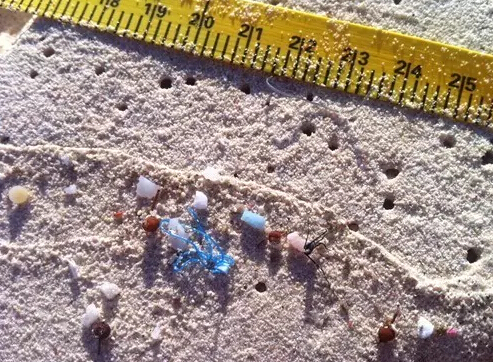 |
|
Microplastics, which are small particles of plastic debris found in cosmetics and cleaning products like toothpastes, is viewed as a major environmental concern along with climate change, ozone depletion and ocean acidification. |
A national key research project on microplastics was recently launched in Shanghai to assess their impact on the ecological environment, especially in the ocean.
Led by East China Normal University, the study will be conducted by several college laboratories and research institutions in a time span from 2016 to late 2020 and aims to detect marine microplastics, establish research standards and monitoring procedures and develop ways to control their risks on the ecosystem.
Microplastics, which are small particles of plastic debris found in cosmetics and cleaning products like toothpastes, are too small to be captured through existing wastewater treatment processes and are washed straight into the oceans.
GESAMP (The Joint Group of Experts on the Scientific Aspects of Marine Environmental Protection), an inter-agency body of the United Nations, listed microplastics as a mild killer whose harm is equal to marine garbage. In 2015, it was viewed as a major environmental concern along with climate change, ozone depletion and ocean acidification.
Due to its widespread presence in the oceans and potential harm to marine life, some countries have already rolled out countermeasures to deal with the increasing concern.
The US was the first country to announce that it would ban microbeads use in cosmetics; the European Commission is developing proposals to ban them in cosmetics across the EU, following calls from a number of member states. And the UK government has announced plans to ban microbeads use in related products by 2017.
Environmental agencies should tighten emissions of microplastics in different land- and sea-based activities, formulate stricter punishment measures for violations and accelerate legislation research on limiting the production and use of microplastics, said Professor Li Daoji, chief expert of the project.
Observers say the public also needs increased awareness of their potential harm to marine life and should refuse to buy cleansing products with polyethylene (PE), polypropylene (PP), polyethylene terephthalate (PET), polymethyl methacrylate (PMMA), polytetrafluoroethylene (PTFE) and nylon.
Follow this news feed: East Asia





